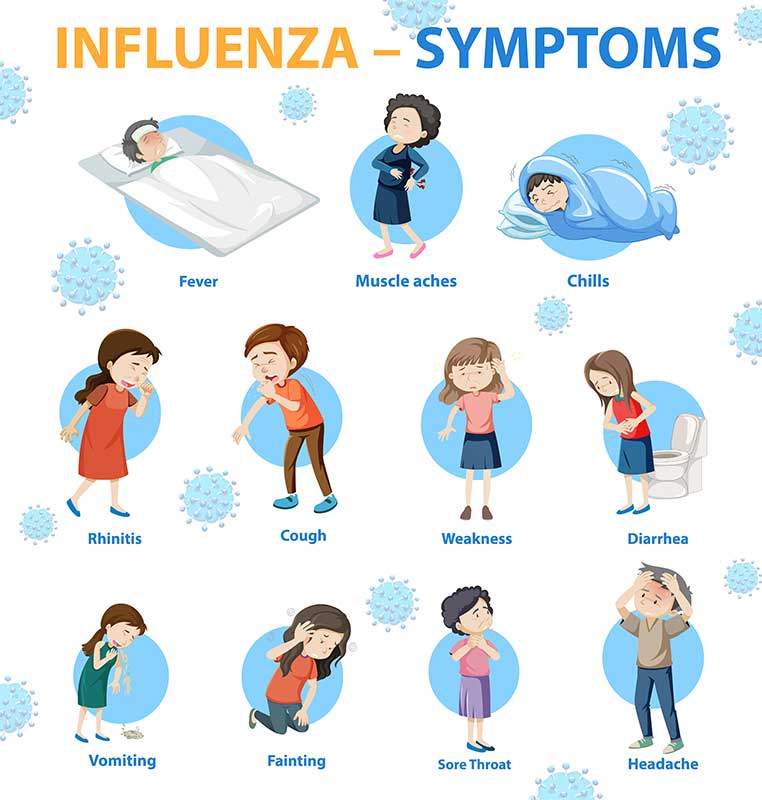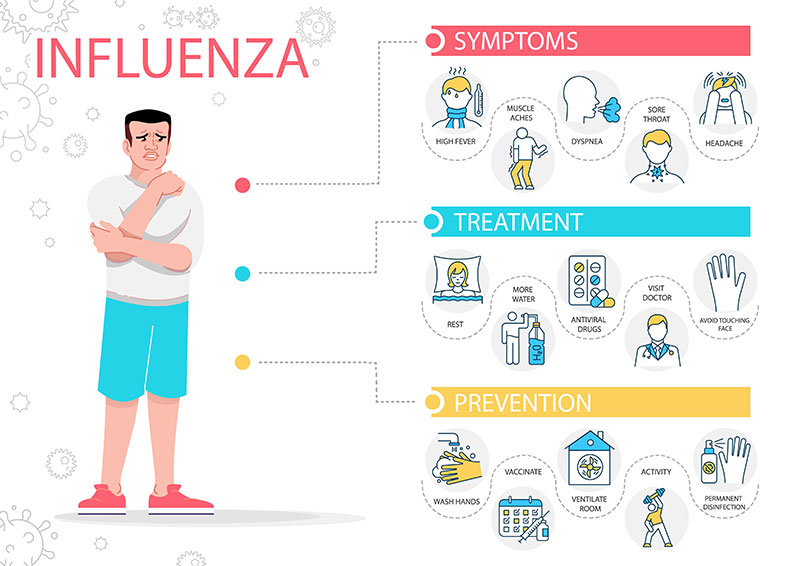The Chinese Centre for Disease Control and Prevention and the National Health Commission have successively issued influenza vaccination guidelines and influenza prevention and control notices for the 2021-2022 influenza epidemic season.
According to influenza data for Hainan Province, since mid-September, the percentage of influenza-like cases (ILI%) in the province has exceeded 3.0%, which indicates that the current influenza has entered the autumn and winter epidemic season.
Influenza outbreaks have increased and the autumn and winter epidemic season of 2021-2022 is earlier than previous years, as well as the intensity being higher.
What is the flu?
Flu is a contagious respiratory illness caused by influenza viruses that infect the nose, throat, and sometimes the lungs. It can cause mild to severe illness, and at times can lead to death. The best way to prevent flu is by getting a flu vaccine each year.
What are flu symptoms?
fever* or feeling feverish/chills
cough
sore throat
runny or stuffy nose
muscle or body aches
headaches
fatigue (tiredness)
some people may have vomiting and diarrhoea, though this is more common in children than adults.
*It’s important to note that not everyone with flu will have a fever.
The source of influenza infection
Most experts believe that flu viruses spread mainly by tiny droplets made when people with flu cough, sneeze or talk. These droplets can land in the mouths or noses of people who are nearby. Less often, a person might get flu by touching a surface or object that has flu virus on it and then touching their own mouth, nose or possibly their eyes.
Who is most likely to be infected with influenza?
A recent Clinical Infectious Diseases (CID) study found that children are most likely to get sick from flu and that people 65 and older are least likely to get sick from influenza.
Median incidence values (or attack rate) by age group were 9.3% for children 0-17 years, 8.8% for adults 18-64 years, and 3.9% for adults 65 years and older. This means that children younger than 18 are more than twice as likely to develop a symptomatic flu infection than adults 65 and older.
Period of Contagiousness
You may be able to spread flu to someone else before you know you are sick, as well as while you are sick.
People with flu are most contagious in the first 3-4 days after their illness begins.
Some otherwise healthy adults may be able to infect others beginning 1 day before symptoms develop and up to 5 to 7 days after becoming sick.
Some people, especially young children and people with weakened immune systems, might be able to infect others for an even longer time.
Onset of Symptoms
The time from when a person is exposed and infected with flu to when symptoms begin is about 2 days, but can range from about 1 to 4 days.
Complications from the Flu
Complications from the flu can include bacterial pneumonia, ear infections, sinus infections and worsening of chronic medical conditions, such as congestive heart failure, asthma, or diabetes.
People at High Risk from Flu
Anyone can get flu (even healthy people), and serious problems related to flu can happen at any age, but some people are at high risk of developing serious flu-related complications if they get sick. This includes people 65 years and older, people of any age with certain chronic medical conditions (such as asthma, diabetes, or heart disease), pregnant women, and children younger than 5 years.
Influenza vaccine supply in Hainan Province
At present, Hainan Province is increasing the procurement and storage of various types of influenza vaccines to ensure the supply in all vaccination clinics. People can go to the nearest community vaccination clinics for an influenza vaccination.
Can influenza vaccine and new coronavirus vaccine be administered at the same time?
At present, research on the immunogenicity and safety impact of simultaneous inoculation of influenza vaccine and new coronavirus vaccine is still in progress.
According to China’s “New Coronavirus Vaccination Technical Guidelines (First Edition)”, it is recommended in principle that the interval between influenza vaccine and new coronavirus vaccination should be adjusted.
More than 14 days, the specific circumstances are divided into:
The new coronavirus vaccine can be administered 14 days after the flu vaccine;
Or get the flu vaccine 14 days after completing the entire vaccination program for the new coronavirus vaccine;
Or inoculate with influenza vaccine between two doses of new coronavirus vaccine, that is, inoculate with influenza vaccine 14 days after the first dose of new coronavirus vaccine, and then receive the second dose of new coronavirus vaccine 14 days later.
It should be noted that choosing the flu vaccine between two doses of the new coronavirus vaccine must follow the requirements for the number of doses and intervals of the new coronavirus vaccine.
Related article: Haikou announces fees for after-school services, 3 Yuan per student per class hour









